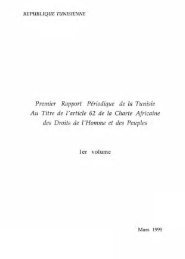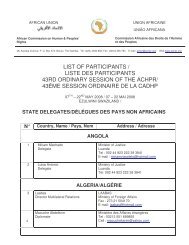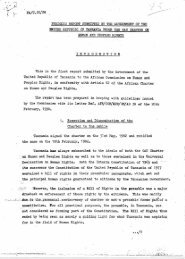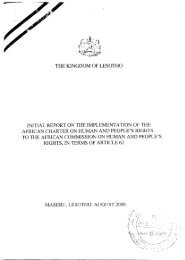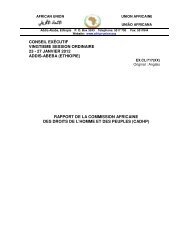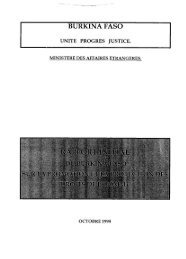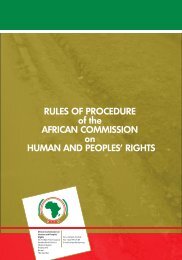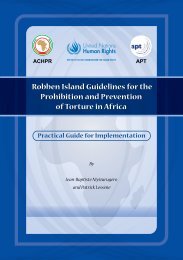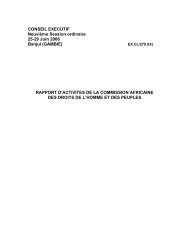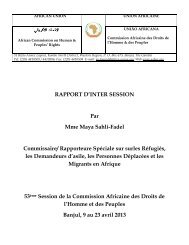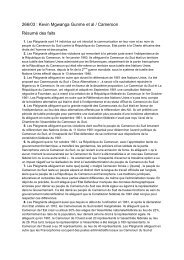307/05 : Obert Chinhamo / Zimbabwe Summary of Facts - African ...
307/05 : Obert Chinhamo / Zimbabwe Summary of Facts - African ...
307/05 : Obert Chinhamo / Zimbabwe Summary of Facts - African ...
You also want an ePaper? Increase the reach of your titles
YUMPU automatically turns print PDFs into web optimized ePapers that Google loves.
<strong>307</strong>/<strong>05</strong> : <strong>Obert</strong> <strong>Chinhamo</strong> / <strong>Zimbabwe</strong><strong>Summary</strong> <strong>of</strong> <strong>Facts</strong>1. The <strong>African</strong> Commission on Human and Peoples’ Rights, (the <strong>African</strong> Commission) received acomplaint/communication on 26 th September 20<strong>05</strong>, from Mr <strong>Obert</strong> <strong>Chinhamo</strong>, (also referred herein asthe Complainant) an employee <strong>of</strong> Amnesty International – <strong>Zimbabwe</strong> Section and an active humanrights defender. The complaint is submitted in accordance with the provisions <strong>of</strong> Article 55 <strong>of</strong> the<strong>African</strong> Charter on Human and Peoples’ Rights (the <strong>African</strong> Charter).2. The Complaint is submitted against the Republic <strong>of</strong> <strong>Zimbabwe</strong>, (also referred herein as theRespondent State), a State Party to the <strong>African</strong> Charter. 1 The Complainant alleges among others that,through the acts <strong>of</strong> the agents <strong>of</strong> the Respondent State his rights protected under the <strong>African</strong> Charterhave been violated. Mr <strong>Chinhamo</strong> lists a number <strong>of</strong> separate incidents to justify his allegations.3. The Complainant alleges that on 28 th August 2004, while investigating and documenting humanrights abuses at Porta Farm, he was allegedly surrounded by more than 10 uniformed police <strong>of</strong>ficersthat assaulted him, poked his face with batons, shouted abusive language and accused him <strong>of</strong>working for a foreign organisation which works against the Respondent State. The Complainant wasthen arrested, forcibly removed from the premises, detained at Norton Police Station, threatened andbanned from returning to Porta Farm and other farms. Upon his release several hours later, theComplainant declares that he was neither charged nor furnished with reasons for his arrest.4. The Complainant alleges further that he and two others were again arrested on 2 nd September2004 while visiting Porta Farm and believes that this arrest was perpetrated in order to prevent themfrom documenting the human rights abuses occurring there. They were given no explanation for thearrest by the arresting <strong>of</strong>ficer but the Complainant was later charged with incitement <strong>of</strong> public violenceand released on One Hundred Thousand (100,000) <strong>Zimbabwe</strong>an Dollars bail. On 21 st February 20<strong>05</strong>,the case was withdrawn for lack <strong>of</strong> evidence.5. The Complainant also alleges that provisions <strong>of</strong> the Public Order and Security Act were used, incontravention <strong>of</strong> the <strong>African</strong> Charter, to deny him access to Porta Farm, prevent the documentation <strong>of</strong>human rights abuses there and <strong>of</strong> holding meetings with residents, and to justify his arrest, detentionand the threaten him against publishing reports and press releases about the human rights abusesdiscovered.6. The Complainant informs the Commission that in September 2004, all files were deleted from hislaptop, while a number <strong>of</strong> Amnesty International – <strong>Zimbabwe</strong> Section Reports disappeared from his<strong>of</strong>fice. The Complainant believes that there is a reasonable probability the Respondent State, throughits agents, invaded his right to privacy.7. Prior to the withdrawal <strong>of</strong> the case against him, the Complainant alleges that Court remands wereabused in order to deny him the right to be tried within a reasonable time limit, psychologically torturehim and deplete his resources. He argues that members <strong>of</strong> the Central Intelligence Organisation (CIO)took pictures <strong>of</strong> him on several occasions, thereby intimidating him.8. In addition, the Complainant notes that the conditions in which he was detained caused him tosuffer torture. These conditions, according to the Complainant, include being locked up in anextremely small, unhygienic cell, infested with parasites where he was denied blankets, deniedpermission to visit the toilet or to bath. According to him, all <strong>of</strong> these caused him to develop a cold,breathing problems and a cough which lasted for about six months.9. The Complainant further alleges that after his release on bail, he was tracked by security agentsand received several threats, including death threats against himself and his brother, which causedhim to fear for his life and the safety <strong>of</strong> his family. Due to this fear, he fled the country in January 20<strong>05</strong>– forcing him to abandon his studies and his job – and is currently residing in the Republic <strong>of</strong> SouthAfrica as an asylum seeker. He added that the Respondent State continues to refuse to issuepassports to his family members so that they can join him in South Africa.
Complaint10. The Complainant alleges that Articles 5, 6, 7, 8, 9, 11, 12, 16, 17 and 18 <strong>of</strong> the <strong>African</strong> Charter onHuman and Peoples’ Rights have been violated.Procedure11. By letter ACHPR/LPROT/COMM/ZIM/<strong>307</strong>/20<strong>05</strong>/ARM <strong>of</strong> 4 th October 20<strong>05</strong>, the Secretariat <strong>of</strong> the<strong>African</strong> Commission acknowledged receipt <strong>of</strong> the communication and informed the Complainant thatthe matter would be considered for seizure at the 38 th Ordinary Session <strong>of</strong> the <strong>African</strong> Commission,scheduled from 21 st November-5 th December 20<strong>05</strong>, in Banjul, The Gambia.12. During the 38 th Ordinary Session held from 21 st November-5 th December 20<strong>05</strong>, the <strong>African</strong>Commission considered the communication and decided to be seized there<strong>of</strong>.13. On 15 th December 20<strong>05</strong>, the Secretariat <strong>of</strong> the <strong>African</strong> Commission informed the partiesaccordingly, and requested the Respondent State to submit its arguments on the admissibility <strong>of</strong> thecommunication. The Secretariat <strong>of</strong> the <strong>African</strong> Commission forwarded a copy <strong>of</strong> the Complaint to theRespondent State.14. On 13 th March 2006, a reminder was sent to the Respondent State requesting it to submit itsarguments on the admissibility <strong>of</strong> the communication.15. On 10 th April 2006, the Secretariat received the Complainant’s submissions on admissibility.16. During the 39 th Ordinary Session held from 11 th – 25 th May 2006, the <strong>African</strong> Commissiondecided to defer consideration <strong>of</strong> the communication on admissibility to its 40 th Ordinary Sessionscheduled to take place from 15 th – 29 th November 2006, pending the Respondent State’s submissionon admissibility.17. By letter <strong>of</strong> 14 th July 2006, the Secretariat <strong>of</strong> the <strong>African</strong> Commission informed the parties <strong>of</strong> theCommission’s decision.18. During the 40 th Ordinary Session held from 15 th – 29 th November 2006, the <strong>African</strong> Commissiondecided to defer consideration <strong>of</strong> the communication on admissibility to the 41 st Ordinary Session.19. On 24 th November 2006, the Secretariat received the Respondent State’s submission onadmissibility.20. By letter dated 11 th December 2006, both parties were informed <strong>of</strong> the Commission’s intention toconsider the communication on admissibility during its 41 st Ordinary Session.21. On 3 th May 2007, the Secretariat received additional submissions on admissibility from theComplainant in response to the Respondent State’s submission on admissibility.22. During the 41 st Ordinary Session <strong>of</strong> the <strong>African</strong> Commission held from 16 th – 30 th May 2007, the<strong>African</strong> Commission decided to further deferred to its 42 nd Ordinary Session a decision on admissibilityto enable the Secretariat prepare a draft decision.<strong>Summary</strong> <strong>of</strong> Complainant’s submission on admissibility23. The Complainant submits that he has locus standi before the Commission as the communicationis brought by himself, a citizen <strong>of</strong> <strong>Zimbabwe</strong>. Regarding compatibility, the Complainant submits thatthe communication raises prima facie violations <strong>of</strong> the Charter, committed by the Respondent State.24. He submits further that in accordance with Article 56.4, the evidence he has submitted reveal thatthe communication is not based exclusively on news disseminated by the mass media, adding that it isbased on first hand evidence from him, including reports by reputable human rights organisations.25. On the requirement <strong>of</strong> exhaustion <strong>of</strong> local remedies in accordance with Article 56.5, theComplainant states that the remedy in his particular circumstance is not available because he cannotmake use <strong>of</strong> local remedies, that he was forced to flee <strong>Zimbabwe</strong> for fear <strong>of</strong> his life after survivingtorturous experiences in the hands <strong>of</strong> the Respondent State due to his activities as a human rightsdefender. The Complainant submits that the onus is on the Respondent State to demonstrate thatremedies are available, citing the Commission’s decisions on communications 71/92 2 and [147/95],14[9]/96 3
26. The Complainant draws the <strong>African</strong> Commission’s attention to its decision on Rights Internationalv Nigeria 4 where the Commission held that a Complainant’s inability to pursue local remediesfollowing his flight for fear <strong>of</strong> his life to Benin, and was subsequently granted asylum was sufficient toestablish a standard for constructive exhaustion <strong>of</strong> local remedies. He concludes by noting thatconsidering the fact that he was no longer in the Respondent State’s territory where remedies could besought, and the fact that he fled the country against his will due to threat to his life, remedies could notbe pursued without impediments.27. The Complainant also challenges the effectiveness <strong>of</strong> the remedies, noting that remedies areeffective only where they <strong>of</strong>fer a prospect <strong>of</strong> success. He claims the Respondent State treats courtrulings that go against it with indifference and disfavour, and says he does not expect that in his case,any decision <strong>of</strong> the court would be adhered to. He says there was a tendency in the Respondent Stateto ignore court rulings that went against it and adds that the <strong>Zimbabwe</strong> Lawyers for Human Rights hasdocumented at least 12 instances where the State has ignored court rulings since 2000. He cites theruling <strong>of</strong> the High Court in the Commercial Farmers Union case and the Mark Chavunduka and RayChoto case where the duo were allegedly abducted and tortured by the army. He concludes that giventhe prevailing circumstances in the Respondent State, the nature <strong>of</strong> his complaint, and theRespondent State’s well publicised practice <strong>of</strong> non-enforcement <strong>of</strong> court decisions, his case has noprospect <strong>of</strong> success if local remedies were pursued, and according to him, not worth pursuing.28. The Complainant submits further that the communication has been submitted within a reasonabletime as required byArticle 56.6 and concludes that the communication has not been settled by anyother international body.<strong>Summary</strong> <strong>of</strong> Respondent State’s submission on Admissibility29. The Respondent State briefly restates the facts <strong>of</strong> the communication and indicates that the factsas submitted by the Complainant ‘have a number <strong>of</strong> gaps’. The State submits that the Complainantmakes general allegations without substantiating, citing for example, the Complainant’s allegation thathe was assaulted, abused and was denied access to the toilet when remanded. The State wonderswhy the Complainant did not bring all these alleged degrading treatment to the attention <strong>of</strong> theMagistrate when he was brought before the latter. The State also questions why the Complainant orhis lawyer did not raise the alleged threats to the Complainant’s life before the Magistrate when hemade four appearances before the latter. The State concluded that the Complainant has failed tosubstantiate his alleged fear and threats to his life and is <strong>of</strong> the opinion that the Complainant left thecountry on his own volition and not as a result <strong>of</strong> any fear occasioned by any <strong>of</strong> its agents.30. On the question <strong>of</strong> admissibility, the State submits that the communication should be declaredinadmissible because, according to the State, it is not in conformity with Articles56(2), 56(5) and 56(6) <strong>of</strong> the Charter.31. The State submits further that the communication is incompatible because it makes a generalallegation <strong>of</strong> human rights violations and does not substantiate the violations, adding that the facts donot show a prima facie violation <strong>of</strong> the provisions <strong>of</strong> the Charter, noting that [quote]‘basically the factsand issues in dispute do not fall within the rationae materiae andrationae personae <strong>of</strong> the jurisdiction<strong>of</strong> the Commission’[quote].32. On the exhaustion <strong>of</strong> local remedies under Article 56.5, the State submits that local remedies areavailable to the Complainant, citing section 24 <strong>of</strong> its Constitution which provides the course <strong>of</strong> action tobe taken where there are allegations human rights violations. The State adds that there is no evidenceto prove that the Complainant pursued local remedies. The State further indicates that in terms <strong>of</strong><strong>Zimbabwe</strong> law, where one is engaged in acts that violate the rights <strong>of</strong> another person, that otherperson can obtain an interdict from the court restraining the violator from such act.33. On the effectiveness <strong>of</strong> local remedies, the State submits that the Constitution provides for theindependence <strong>of</strong> the judiciary in the exercise <strong>of</strong> its mandate in conformity with both the UN [Basic]Principles on [the] Independen[ce <strong>of</strong> the] Judiciary, and the <strong>African</strong> Commission’s Guidelines on theRight to a Fair Trial [and Legal Aid in Africa.34. The State dismisses the Complainant’s argument that his case is similar to those brought by SirDawda Jawara against the Republic <strong>of</strong> The Gambia, and Rights International (on behalf <strong>of</strong> Charles
Baridorn Wiza) against the Federal Republic <strong>of</strong> Nigeria, adding that in the latter cases, there was pro<strong>of</strong><strong>of</strong> real threat to life. The State goes further to indicate instances where the government hasimplemented court decisions that went against it, adding that even in the present case involving theComplainant, the government respected the Court’s decision.35. The State further indicates that in terms <strong>of</strong> <strong>Zimbabwe</strong> law, it is not a legal requirement for aComplainant to be physically present in the country in order to access local remedies, adding that,both the High Court Act (Chapter 7:06) and the Supreme Court Act (Chapter 7:<strong>05</strong>) permit any personto make an application to either court through his/her lawyer. The State adds that in the Ray Chotoand Mark Chavhunduka case, the victims were tortured by state agents and they applied forcompensation while they were both in the United Kingdom, and succeeded in their claim. The Stateconcludes that the Complainant is not barred from pursuing remedies in a similar manner.36. The State also argues that the communication does not comply with Article 56.6 <strong>of</strong> the Charterwhich provides that a communication should be lodged within a reasonable time after exhaustion <strong>of</strong>local remedies, but where Complainant realises that local remedies shall be unduly prolonged he/shemust submit the complaint to the Commission immediately. According to the State, although theCharter does not specify what constitutes a reasonable time, the Commission should get inspirationfrom the other jurisdictions, including the Inter-American Commission which has fixed six months asreasonable time, adding that even the draft protocol merging the <strong>African</strong> Court <strong>of</strong> Justice and the<strong>African</strong> Court on Human and Peoples’ Rights provides for a six months period.37. The State concludes its submissions by noting that ‘no cogent reasons have been given for thefailure to pursue local remedies or remedies before the Commission within a reasonable time’ and assuch the communication should be declared inadmissible.LawAdmissibilityCompetence <strong>of</strong> the <strong>African</strong> Commission38. In the present communication, the Respondent State raises a preliminary question regarding thecompetence <strong>of</strong> the <strong>African</strong> Commission to deal with this communication. The State aversthat: “basically the facts and issues in dispute do not fall within the rationae materiae and rationaepersonae <strong>of</strong> the jurisdiction <strong>of</strong> the Commission”. This statement questions the competence <strong>of</strong> the<strong>African</strong> Commission to deal with this communication. The Commission will thus first deal with thepreliminary issue <strong>of</strong> its competence raised by the Respondent State.39. Black’s Law Dictionary defines rationae materiae as “by reason <strong>of</strong> the matter involved; inconsequence <strong>of</strong>, or from the nature <strong>of</strong>, the subject-matter.” While rationae personae is defined as “Byreason <strong>of</strong> the person concerned; from the character <strong>of</strong> the person”.40. Given the nature <strong>of</strong> the allegations contained in the communication, notably, allegations <strong>of</strong>violation <strong>of</strong> personal integrity or security, intimidation and torture, the Commission is <strong>of</strong> the view thatthe communication raises material elements which may constitute human rights violations, and assuch it has competence rationae materiae to entertain the matter, because the communication allegesviolations to human rights guaranteed and protected in the Charter. With regards to the Commission’scompetence rationae personae, the communication indicates the name <strong>of</strong> the author, an individual,whose rights under the <strong>African</strong> Charter, the Respondent State is committed to respecting andprotecting. With regards to the State, the Commission notes that <strong>Zimbabwe</strong>, the Respondent State inthis case, has been a State Party to the <strong>African</strong> Charter since 1986. Therefore, both the Complainantand the Respondent State have locus standi before the Commission, and the Commission thus hascompetence rationae personae to examine the communication before it.41. Having decided that it has competence rationae materiae and rationae personae, theCommission will now proceed to pronounce on the admissibility requirements and the contentiousareas between the parties.The <strong>African</strong> Commission’s decision on admissibility
42. The admissibility <strong>of</strong> communications before the <strong>African</strong> Commission is governed by therequirements <strong>of</strong> Article 56 <strong>of</strong> the <strong>African</strong> Charter. This Article provides seven requirements which mustall be met before the <strong>African</strong> Commission can declare a communication admissible. If one <strong>of</strong> theseconditions/requirements is not met, the <strong>African</strong> Commission will declare the communicationinadmissible, unless the Complainant provides justifications why any <strong>of</strong> the requirements could not bemet.43. In the present communication, the Complainant avers that his complaint meets the requirementsunder Articles 56(1),56(2), 56(3), 56(4), 56(6) and 56(7). He indicates that he did not attempt tocomply with the requirement under Article 56dealing with the exhaustion lf local remedies, because <strong>of</strong>the nature <strong>of</strong> his case and the circumstances under which he left the Respondent State, and since heis presently living in South Africa, the exception rule should be invoked. He states that his inability toexhaust local remedies was due to the fact that he had to flee to South Africa for fear for his life.44. The State on the other hand argues that the Complainant has not complied with the provisions <strong>of</strong>Article 56 sub-sections 2, 5 and 6 <strong>of</strong> the Charter, and urges the Commission to declare thecommunication inadmissible based on the non-fulfillment <strong>of</strong> these requirements.45. The admissibility requirements under Article 56 <strong>of</strong> the Charter are meant to ensure that acommunication is properly brought before the Commission, and seeks to sieve frivolous and vexatiouscommunications before they reach the merits stage. As indicated earlier, for a communication to bedeclared admissible, it must meet all the requirements under Article 56. Therefore, if a party contendsthat another party has not complied with any <strong>of</strong> the requirements, the Commission must pronounceitself on the contentious issues between the parties. This however does not mean that otherrequirements <strong>of</strong>Article 56 which are not contested by the parties will not be examined by theCommission.46. Article 56.1 <strong>of</strong> the <strong>African</strong> Charter provides that communications will be admitted if they indicatetheir authors, even if they request anonymity. In the present case the author <strong>of</strong> this communication isidentified as Mr <strong>Obert</strong> <strong>Chinhamo</strong>, he has also not requested that his identity be hidden. TheRespondent State has also been clearly identified as the Republic <strong>of</strong> <strong>Zimbabwe</strong>. Therefore theprovision <strong>of</strong> Article 56.1 has been adequately complied with.47. Article 56.2 <strong>of</strong> the <strong>African</strong> Charter provides that a communication must be compatible with theCharter <strong>of</strong> the OAU or with the <strong>African</strong> Charter on Human and Peoples’ Rights. In the presentcommunication, the Respondent State argues that the communication does not comply with thisrequirement, that is, the communication is not compatible with the provisions <strong>of</strong> the Constitutive Act <strong>of</strong>the <strong>African</strong> Union or the <strong>African</strong> Charter itself. The State asserts in this regard that, for a complaint tobe compatible with the Charter or the Constitutive Act, it must prove a prima facie violation <strong>of</strong> theCharter.48. Compatibility according to the Black’s Law Dictionary denotes ‘in compliance with’ and ‘inconformity with’ or [/quote]‘not contrary to’[/quote] or ‘against’. In this communication, the Complainantalleges among others, violations <strong>of</strong> his right to personal integrity and being subjected to intimidation,harassment and psychological torture, arbitrary detention, violation <strong>of</strong> freedom <strong>of</strong> movement and loss<strong>of</strong> resources occasioned by the actions <strong>of</strong> the Respondent State. These allegations do raise aprimafacie violation <strong>of</strong> human rights, in particular, the right to the security <strong>of</strong> the person or personal integrityand freedom from torture guaranteed in the Charter. Complainants submitting communications to theCommission need not specify which articles <strong>of</strong> the Charter have been violated, or even which right isbeing invoked, so long as they have raised the substance <strong>of</strong> the issue in question. Based on theabove, the <strong>African</strong> Commission is satisfied that in the present communication, the requirement<strong>of</strong> Article 56.2 <strong>of</strong> the <strong>African</strong> Charter has been sufficiently complied with.49. Article 56.3 <strong>of</strong> the Charter provides that a communication will be admitted if they are not written indisparaging or insulting language directed against the State concerned and its institutions or to theOrganisation <strong>of</strong> <strong>African</strong> Unity (<strong>African</strong> Union). In the present case, the communication sent by theComplainant does not, in the view <strong>of</strong> this Commission, contain any disparaging or insulting language,and as a result <strong>of</strong> this, the requirement <strong>of</strong> Article 56.3 has been fulfilled.50. Article 56.4 <strong>of</strong> the Charter provides that the communication must not be based exclusively onnews disseminated through the mass media. This communication was submitted by the Complainant
himself and is his account <strong>of</strong> his personal experience with the law enforcement agents <strong>of</strong> theRespondent State. For this reason he has fulfilled the provision <strong>of</strong> Article 56.4.51. Article 56.5 provides that communications to be considered by the <strong>African</strong> Commission must besent after local remedies have been exhausted. The Respondent State contends that the Complainanthas not complied with this requirement. The State argues that there are sufficient and effective localremedies available to the Complainant in the State, and the Complainant has not sought theseremedies before bringing the present communication before the Commission. On the other hand, theComplainant argues that since he had to flee the country due to fear for his life, he could not comeback to the country to pursue these local remedies.52. The rationale for the exhaustion <strong>of</strong> local remedies is to ensure that before proceedings arebrought before an international body, the State concerned must have the opportunity to remedy thematter through its own local system. This prevents the international tribunal from acting as a court <strong>of</strong>first instance rather than as a body <strong>of</strong> last resort. 553. Three major criteria could be deduced from the practice <strong>of</strong> the Commission in determiningcompliance with this requirement, that is: the remedy must be available, effective and sufficient.54. In Jawara v The Gambia, 6 , the Commission stated that “a remedy is considered available if thepetitioner can pursue it without impediment; it is deemed effective if it <strong>of</strong>fers a prospect <strong>of</strong> success andit is found sufficient if it is capable <strong>of</strong> redressing the complaint”. In the Jawara Communication, whichboth parties have cited, the Commission held that “the existence <strong>of</strong> a remedy must be sufficientlycertain, not only in theory but also in practice, failing which, it will lack the requisite accessibility andeffectiveness. …Therefore, if the applicant cannot turn to the judiciary <strong>of</strong> his country because <strong>of</strong> fearfor his life (or even those <strong>of</strong> his relatives), local remedies would be considered to be unavailable tohim”.55. The Complainant in the present Communication claims that he left his country out <strong>of</strong> fear for hislife due to intimidation, harassment and torture. He said due to the nature <strong>of</strong> his work, the agents <strong>of</strong>the Respondent State started tracking him with a view to harming and/or killing him. He has alsodescribed how he was treated while in detention, noting that he was denied food, he was not attendedto when he complained <strong>of</strong> headache, he was refused visit to the toilet, that the conditions in theholding cells were bad – smelling, small, toilets could not flush, toilets were overflowing with urine andother human waste, the cells were infested with parasites such as mosquitoes which suckedComplainant’s blood for the duration <strong>of</strong> his stay and made sleep impossible for the Complainant, thecell had a bad stench and was very cold, resulting in the Complainant contracting breathing problemsand a cough which lasted for six months, Complainant was refused a blanket during the night andfurther refused permission to take his bath. According to the Complainant, all these constituted tortureand inhuman and degrading treatment.56. The Complainant alleged further that the Respondent State used court remands to deny him <strong>of</strong> atrial within a reasonable time, thus psychologically torturing him and depleting his resources.According to the Complainant, the matter was remanded at least five times – from 20 th September2004 – 21 st February 20<strong>05</strong> (within a period <strong>of</strong> six months), and he noted that these remands werecalculated to harass and psychologically torture him. He said most <strong>of</strong> the time, the Central IntelligenceOrganisation would come and take pictures <strong>of</strong> him thus, intimidating him.57. [The] Complainant added that when he continued publishing the Respondent’s human rightsabuses in Porta Farm, the Respondent State sent its security agents to trail him and on variousoccasions, attempts were made to harm him. According to the Complainant, on 12 th September2004, “man suspected to be a CIO <strong>of</strong>ficial driving a white Mercedes went to the Complainant’s familyand left threatening messages <strong>of</strong> death to Complainant’s brother”. The message from the CIO <strong>of</strong>ficial,according to the Complainant was that the Complainant was an enemy <strong>of</strong> the state and will be killed.[The] Complainant was forced to call his brother to stay with him for security reasons. In anotherincident, the same man, this time accompanied by three others, paid a second visit and issued similarthreats to the Complainant.58. He indicated that on 30 th September 2004, he was stopped by men driving a blue Mercedes Benzwho again threatened him. He said because this later incident took place near his house, it wasenough reason for him to be afraid for his life. He added that in August 2004, on several occasions he
in the presence <strong>of</strong> 3 others, namely Bishop Shumba, Taurai Magayi and Charles Mutama was takinginstructions from one <strong>of</strong> his clients, a Mr John Sikhala in a matter involving alleged politicalharassment by 20 members <strong>of</strong> the <strong>Zimbabwe</strong> Republic Police (ZRP). Mr John Sikhala is a Member <strong>of</strong>Parliament for the Movement for Democratic Change (MDC), which is the opposition party in<strong>Zimbabwe</strong>. At about 11:00 pm riot police accompanied by plain-clothes policemen and personnelidentified to be from the Central Intelligence Organisation stormed the room and arrested everyonepresent. During the arrest, the Complainant’s law practicing certificate, diary, files, documents and cellphone were confiscated and he was slapped and kicked several times by, among others, the Officer inCharge <strong>of</strong> Saint Mary’s Police Station.71. Mr Shumba and the others were taken to Saint Mary’s Police Station where he was detainedwithout charge and denied access to legal representation. He was also denied food and water. TheComplainant claims that on the next day following his arrest, he was removed from the cell, a hoodwas placed over his head and he was driven to an unknown location where he was led down whatseemed like a tunnel, to a room underground. The hood was removed, he was stripped naked and hishands and feet were bound in a foetal position and a plank was thrust between his legs and arms.While in this position, the Complainant was questioned and threatened with death by about 15interrogators. The Complainant further alleged that he was also electrocuted intermittently for 8 hoursand a chemical substance was applied to his body. He lost control <strong>of</strong> his bodily functions, vomitedblood and he was forced to drink his vomit. The Complainant submitted a certified copy <strong>of</strong> a medicalreport describing the injuries found on his body. Following his interrogation at around 7pm <strong>of</strong> the sameday, the Complainant was unbound and forced to write several statements implicating him and severalsenior MDC members in subversive activities. At around 7.30pm he was taken to Harare PoliceStation and booked into a cell. On the third day <strong>of</strong> his arrest, his lawyers who had obtained a HighCourt injunction ordering his release to court were allowed to access him. The Complainant wassubsequently charged under Section 5 <strong>of</strong> the Public Order and Security Act that relates to organising,planning or conspiring to overthrow the government through unconstitutional means. He then fled<strong>Zimbabwe</strong> for fear <strong>of</strong> his life.72. In the four cases cited above, there is one thing in common – the clear establishment <strong>of</strong> theelement <strong>of</strong> fear perpetrated by identified state institutions, fear which in the Jawara Case, theCommission observed that “it would be reversing the clock <strong>of</strong> justice to request the Complainant toattempt local remedies”. In the Abubakhar Case, the Complainant’s sister and wife were arrested t<strong>of</strong>orce the Complainant to return, his house was regularly surrounded and searched, and his mother’svillage was visited by state agents looking for him. In the Shumba Case, the State never refuted theallegations <strong>of</strong> torture or the authenticity <strong>of</strong> the medical reports, but simply argued that Complainantcould have seized the local courts for redress.73. In the case under consideration, the Complainant, Mr <strong>Obert</strong> <strong>Chinhamo</strong> has presented a picture <strong>of</strong>the conditions <strong>of</strong> detention, which without prejudice to the merits <strong>of</strong> the communication, can be termedinhuman and degrading. He also pointed out instances <strong>of</strong> alleged intimidation and harassment byState agents.74. Every reasonable person would be concerned and afraid for their life if they had State Securityagents prying into their everyday activities. [The] Complainant had every reason to be concerned forhis safety and that <strong>of</strong> his family. However, it should be noted that Complainant did not identify any <strong>of</strong>the men tracking him to be State agents. According to his submissions, the people harassing him wereanonymous, unknown or suspected CIO <strong>of</strong>ficials, and in some cases, he simply observed somestrange men around his home and his place <strong>of</strong> work. In none <strong>of</strong> the instances <strong>of</strong> alleged harassmentor intimidation mentioned by the Complainant did he identify his alleged persecutors as agents <strong>of</strong> theRespondent State. He based his fear on suspicion, which was not corroborated.75. Of particular importance here is to note that in spite all the threats, harassment, intimidations,threatening phone calls and alleged tracking by Respondent States’ agents, [the] Complainantchooses not to report the matter to the police. From his submissions, he was harassed and intimidatedfor over six months, that is, from August 2004 when he claims he was first arrested, to January 20<strong>05</strong>,when he left the country. In his submissions, he did not indicate why he could not submit the matter tothe police for investigation but preferred reporting to his employers and his lawyers. In the opinion <strong>of</strong>
the Commission, the Complainant has not substantiated his allegations with facts. Even if, forexample, the detention <strong>of</strong> the Complainant amounted to psychological torture, it could not have beenlife-threatening to cause the Complainant flee for his life. Apart from the alleged inhumane conditionsunder which he was held, there is no indication <strong>of</strong> physical abuse like in theShumba and Wiwa cases.Torture could not have been the cause for the Complainant’s fleeing the country because the allegedinhumane and degrading or torturous treatment occurred in August/September 2004, and theComplainant remained in the country until January 20<strong>05</strong>, and even made court appearances on atleast four occasions to answer charges brought against him. The alleged intimidation and threat to theComplainant’s life occurred between August and October 2004. This means that by the time theComplainant left for South Africa in January 20<strong>05</strong>, the alleged threats and intimidation had ceased.There is therefore no evidence to prove that his leaving the Respondent State was as a result <strong>of</strong> fearfor his life occasioned by threats and intimidation, or that even if he was threatened and intimidated,this could be attributed to the Respondent State.76. The Complainant has simply made general allegations and has not corroborated his allegationswith documentary evidence or testimonies <strong>of</strong> others. He has not shown, like in the other casesmentioned above, the danger he found himself in that necessitated his fleeing the country. Withoutconcrete evidence to support the allegations made by the Complainant, the Commission cannot holdthe Respondent State responsible for whatever harassment, intimidation and threats that theComplainant alleges he suffered, that made him flee the country for his life. This is even so because[the] Complainant never bothered to report these incidences to the police or raise them with themagistrate when he appeared four times in the Respondent[‘s] court. If the intimidation and threatswere not brought to the attention <strong>of</strong> the State for investigation, and if the State was not in a position toknow about them, it would be inappropriate to hold the State responsible.77. Having said that, the question is, could the Complainant still have exhausted local remedies orbetter still, is he required to exhaust local remedies, even outside the Respondent State?.78. The first test that a local remedy must pass is that it must be available to be exhausted. Theword “available” means “readily obtainable; accessible” 10 ; or “attainable, reachable; on call, on hand,ready, present; . . . convenient, at one’s service, at one’s command, at one’s disposal, at one’s beckand call.” 1179. According to this Commission, a remedy is considered to be available if the petitioner can pursueit without impediments or if he can make use <strong>of</strong> it in the circumstances <strong>of</strong> his case. 12 Were thereremedies available to the Complainant even from outside the Respondent State?80. The State indicates that in terms <strong>of</strong> its laws, a Complainant need not be physically present in thecountry in order to access local remedies, adding that both the High Court Act and the Supreme CourtAct permit any person to make an application to either court through his/her lawyer. In support <strong>of</strong> this,the State cites the Ray Choto and Mark Chavhunduka Case where the victims were tortured by Stateagents, and they applied for compensation while they were both in the United Kingdom andsucceeded in their claim. The State concluded that the Complainant is not barred from pursuingremedies in a similar manner.81. The Complainant does not dispute the availability <strong>of</strong> local remedies in the Respondent State, butargues that in his particular case, having fled the country for fear <strong>of</strong> his life, and now out <strong>of</strong> the country,local remedies are not available to him.82. This Commission holds the view that having failed to establish that he left the countryinvoluntarily due to the acts <strong>of</strong> the Respondent State, and in view <strong>of</strong> the fact that under <strong>Zimbabwe</strong> law,one need not be physically in the country to access local remedies; the Complainant cannot claim thatlocal remedies are not available to him.83. The Complainant argues that even if local remedies were available, they were not effectivebecause the State has the tendency <strong>of</strong> ignoring court rulings taken against it, citing among others theHigh Court decision in the Commercial Farmers Union Case and the Ray Choto and MarkChavhunduka case, and added that the <strong>Zimbabwe</strong> Lawyers for Human Rights has documented atleast 12 instances where the State has ignored court rulings since 2000.84. It is not enough for a Complainant to simply conclude that because the State failed to complywith a court decision in one instance, it will do the same in their own case. Each case must be treated
on its own merits. Generally, this Commission requires Complainants to set out in their submissionsthe steps taken to exhaust domestic remedies. They must provide some prima facie evidence <strong>of</strong> anattempt to exhaust local remedies. This position is supported by other human rights bodies around theglobe. The UN Human Rights Committee, for example, has stated that the mere fact that a domesticremedy is inconvenient or unattractive, or does not produce a result favourable to the petitioner doesnot, in itself, demonstrate the lack or exhaustion <strong>of</strong> all effective remedies. 13 In the Committee’sdecision in A v Australia, 14 it was held that “mere doubts about the effectiveness <strong>of</strong> local remedies orprospect <strong>of</strong> financial costs involved did not absolve the author from pursuing such remedies.” 1585. The European Court <strong>of</strong> Human Rights on its part has held that even if the applicants have reasonto believe that available domestic remedies and possible appeals will be ineffective, they should seekthose remedies since “it is generally incumbent on an aggrieved individual to allow the domestic courtsthe opportunity to develop existing rights by way <strong>of</strong> interpretation.” 16 InArticle 19 v Eritrea, 17 theCommission held that “it is incumbent on the Complainant to take all necessary steps to exhaust, or atleast attempt the exhaustion <strong>of</strong> local remedies. It is not enough for the Complainant to cast aspersionon the ability <strong>of</strong> the domestic remedies <strong>of</strong> the State due to isolated incidences”.86. From the above analysis, this Commission is <strong>of</strong> the view that the Complainant ignored to utilisethe domestic remedies available to him in the Respondent State, which had he attempted, might haveyielded some satisfactory resolution <strong>of</strong> the complaint.87. The third issue <strong>of</strong> contention between the Complainant and the Respondent State is therequirement under Article 56.6 <strong>of</strong> the Charter which provides that “ommunications received by theCommission will be considered if they are submitted within a reasonable period from the time localremedies are exhausted, or from the date the Commission is seized with the matter…”88. The present communication was received at the Secretariat <strong>of</strong> the Commission on26 th September 20<strong>05</strong>. It was considered on seizure by the Commission in November 20<strong>05</strong>, that is, tenmonths after the Complainant allegedly fled from the country. The Complainant left the country on12 th January 20<strong>05</strong>.89. The Commission notes that the Complainant is not residing in the Respondent State and neededtime to settle in the new destination, before bringing his complaint to the Commission. Even if theCommission were to adopt the practice <strong>of</strong> other regional bodies to consider six months as thereasonable period to submit complaints, given the circumstance in which the Complainant findshimself, that is, in another country, it would be prudent, for the sake <strong>of</strong> fairness and justice, to considera ten months period as reasonable. The Commission thus does not consider the communication tohave been submitted contrary to Article 56.6 <strong>of</strong> the Charter.Holding90. Lastly, Article 56.7 provides that the communication must not deal with cases which have beensettled by the states, in accordance with the principles <strong>of</strong> the United Nations, or the Charter <strong>of</strong> theOAU or the <strong>African</strong> Charter. In the present case, this case has not been settled by any <strong>of</strong> theseinternational bodies and as a result <strong>of</strong> this, the requirement <strong>of</strong> Article 56.7 has been fulfilled by theComplainant. The <strong>African</strong> Commission finds that the Complainant in this communication, thatis,Communication <strong>307</strong>/<strong>05</strong> <strong>Obert</strong> <strong>Chinhamo</strong>/Republic <strong>of</strong> <strong>Zimbabwe</strong>, has not fulfilled the requirementunder Article 56.5 <strong>of</strong> the <strong>African</strong> Charter, and therefore declares the communication inadmissible.Done in Brazzaville, Republic <strong>of</strong> Congo, at its 42 nd Ordinary Session held from 14-28 November, 2007.Footnotes1. <strong>Zimbabwe</strong> ratified the <strong>African</strong> Charter on 30 th May 1986.2. Rencontre africaine pour la défense des droits de l’Homme v Zambia.3. Sir Dawda Kairaba Jawara v The Gambia.4. Communication 215/1998.5. See communications 25/8[9, 47/90, 56/91, 100/93], 74/92 and 83/92.
6. Communication 149/967. Communication 103/19938. Communications 215/1998.9. Communication 288/2004.10. Webster’s Encyclopedic Unabridged Dictionary <strong>of</strong> the English Language, 102 (1989)11. Longman Synonym Dictionary, 82 (1986).12. Jawara v The Gambia, supra.13. Nos. 220/1987, T. K. v. France; 222/1987, M. K. v. France; 306/1988, J. G. v. The Netherlands, in 2 Report <strong>of</strong>the Human Rights Committee 188, 122; 127, 130; 180, 182–83, UN Doc. A/45/40 (1990) [hereinafter HRC 1990Report].14. Communication No. 560/1993, UN Doc CCPR/C/59/D/560/1993 (1997)15. See also L Emil Kaaber v Iceland, Communication No. 674/1995. UN Doc. CCPR/C/58/D/674/1995 (1996).See also Ati Antoine Randolph v. Togo, Communication No. 910/2000, UN Doc. CCPR/C/79/D/910/2000 (2003).16. Philip Leach, Taking a Case to the European Court <strong>of</strong> Human Rights 79 (2001) (quoting Earl Spencer andCountess Spencer v. United Kingdom, App. Nos. 28851/95, 28852/95 (Eur. Comm’n on H.R. 1998).17. Communication 275/2003.



